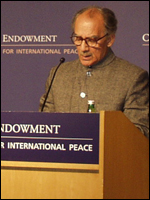Registration
You will receive an email confirming your registration.
IMGXYZ908IMGZYX The Indian stance on Tibet has been too accommodating to China, and such a misguided policy will have serious implications, said Arun Shourie at Carnegie on May 21, 2008.
Shourie said he agreed with the Dalai Llama’s assessment that “cultural genocide” was indeed taking place in Tibet. Shourie noted the Chinese government’s promotion of migration of Han Chinese into Tibet, as well as the use of the region as a site for waste disposal, missiles, and the production of nuclear weapons.
Shourie said India’s position on Tibet must be understood in the context of Sino-Indian relations. Out of fear of provoking China, India has not done enough to prepare its side of the border in case Chinese ambitions grow beyond Tibet, said Shourie. Since the 1962 war with China, Indians have been mortified of a future conflict, and as a result have felt the need to be deferential to China.
Such deference has manifested itself in a “web of rationalizations,” said Shourie. Indian politicians have dismissed Chinese incursions onto Indian soil by claiming that a bond of anti-imperialism joins India and China. Some have argued that as India champion’s China’s case in the UN, China will have to behave respectfully. Others appeal to China’s official rhetoric and insist that China’s rise is a peaceful one. And finally, Shourie said that Indian politicians like to claim that China supports India’s ascension to permanent membership in the UN Security Council, a position Shourie said China appears to have no interest in promoting. With regard to Tibet, India has claimed to merely be “recognizing reality on the ground,” said Shourie. Such rationalizing reduces the quality of discourse on the issue, and furthermore makes it difficult to craft a consistent policy on China.
In contrast with claims that China was essentially a good neighbor of India, Shourie argued that China sees India as part of U.S. strategy to contain China. In response, China is trying to contain India by arming Pakistan and fortifying Tibet, said Shourie.
The history of Indian policy on Tibet goes back to 1959, when India, Pakistan, and Burma all agreed to accept the boundaries drawn by the British as the official territorial borders. China, however, refused to accept the British boundaries because doing so would have meant accepting the ability of the Tibetan government to sign treaties in 1949.
Shourie said that Indian cravenness towards China allows incidents like the Chinese attack on the Buddhist temple inside India on October 3, 2007. Shourie categorized that attack as part of a pattern of China’s strategy to gradually gain more breathing room in its interactions with India. In addition, he said, China has been trying to acquire major capabilities for force projection.
Today, China has been using the controversy over the Oylmpic torch to shore up nationalist sentiment while they wait for the Dalai Llama to die, he said. Shourie encouraged India and the world to wake up to China’s ambitions and to Tibet as a potential trouble spot.
In the question and answer session, one participant asked about the role of water in the Tibet issue. Shourie responded that one of China’s proposed responses to its water shortage is to divert water from Tibet to the north, which would have devastating results for India.
Another participant asked about the impact of the Olympics being held in China on its claim to Tibet. The participant noted that one of China’s five mascots for the games is the Tibetan antelope, which the participant saw as a way of arguing that Tibet is an essential part of China. He asked whether Shourie believed countries should boycott the Olympics based on the status of Tibet. Shourie said that such actions only will have an impact if happen in concert, and that what happens after the Olympics is more important that what happens before or during the Olympics.
Asked about the significance of Iranian President Mahmoud Ahmadinejad’s recent visit to India, Shourie responded, “all politics is local.” Ahmadinejad’s visit was a way to pander for Muslim votes, and to indicate that the Congress party is not wedded to the United States on issues of foreign policy.
